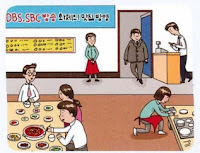가: 맛집으로 소문난 식당에 간다고 하더니 어땠어요?
가: You said you were going to visit the famous restaurant for its excellent cuisine. How was it?
나: 맛은 있었는데 손님이 들어오건 나가건 종업원들이 신경도 안 쓰고 인사도 제대로 안 하는 거 있죠?
나: The food was good, but regardless of whether customers were entering or leaving, the staff didn’t seem to pay attention or even to greet them properly.
가: 그래요? 너무 바빠서 그런 거 아닐까요?
가: Really? Didn’t they do that because they were just too busy?
나: 그럴 수도 있겠지만 바쁘건 한가하건 손님에게 친절하게 대하는 게 기본 아닌가요?
나: That might be so, but whether you’re busy or idle, isn’t it just common courtesy to treat the customers politely?
A/V-건 A/V-건 is the abbreviated form of -거나 -거나 and is used to indicate two comparable or contrasting clauses and that the result of choosing either one of the options or situations in the clauses will be the same.
 저는 일찍 자건 늦게 자건 매일 같은 시간에 일어나요.
저는 일찍 자건 늦게 자건 매일 같은 시간에 일어나요.
Regardless of whether I go to bed early or late, I get up at the same time every day.
지켜보는 사람이 있건 없건 규칙은 지켜야 해요.
Regardless of whether there is someone watching, the rules must be followed.
그 일을 스스로 했건 다른 사람의 도움을 받아서 했건 중요한 것은 기한 내에 끝냈다는 거예요.
Regardless of whether you did that job yourself or received help from others, the important thing is that you finished it by the deadline.
1. The phrase 간에 or 상관없이 can be added to this expression to clarify its meaning.
• 월급이 많건 적건 간에 맡은 일은 최선을 다해야지요.
• 비가 오건 눈이 오건 상관없이 내일 행사는 계획대로 진행됩니다.
2. The question words 누구(누가), 언제, 어디서, 무엇(무슨), and 어떻게(어떤) can be used together with -건 to express the same meaning.
• 누가 이 일을 맡건 간에 잘해 낼 수 있을 거라 믿습니다.
• 무슨 일을 하건 자기가 좋아하는 것을 하는 게 중요해요.
3. This expression is interchangeable with the expressions ‘-든(지) -든(지)’ and ‘-든가 -든가’ with no major change in meaning.
• 저는 일찍 자든지 늦게 자든지 매일 같은 시간에 일어나요.
• 지켜보는 사람이 있든가 없든가 규칙은 지켜야 해요.
4. To emphasize the contrastive meaning of this expression, it is sometimes used with the positive and negative forms of the same verb, such as -건 안 -건,-건 못 -건, and -건 말건.
• 그 사람이 나오건 안 나오건 일단 약속 장소에 나가서 기다려 봐.
• 제가 먹건 말건 신경 쓰지 마세요.
>> You can click on the title of each grammar below to see other grammars which also express ‘Choices’
1. -느니
2. -(으)ㄹ 바에야
3. -건 -건
4. -(느)ㄴ다기보다는
>> Full of ‘Korean grammar in use – Intermediate’: Click here
>> Full of ‘Korean grammar in use – Advanced’: Click here
>> Follow my page to get Korean lessons: Say Hi Korean

